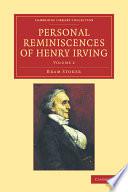
“I have never seen so iron a countenance.”
Describing his first meeting of Sir Richard Francis Burton and his wife Isabel, on 13 August 1878, Vol. 1, p. 224
Personal Reminiscences of Henry Irving (1907)
Context: I could not but be struck by the strangers. The lady was a big, handsome blonde woman, clever-looking and capable. But the man riveted my attention. He was dark, and forceful, and masterful, and ruthless. I have never seen so iron a countenance. I did not have much time to analyse the face; the bustle of arrival prevented that. But an instant was enough to make up my mind about him. We separated in the carriage after cordial wishes that we might meet again. When we were on the platform, I asked Irving:
"Who is that man?"
"Why," he said, " I thought I introduced you!"
"So you did, but you did not mention the names of the others!" He looked at me for an instant and said inquiringly as though something had struck him:
"Tell me, why do you want to know?"
"Because," I answered, "I never saw any one like him. He is steel! He would go through you like a sword!"
"You are right!" he said. "But I thought you knew him. That is Burton — Captain Burton who went to Mecca!
